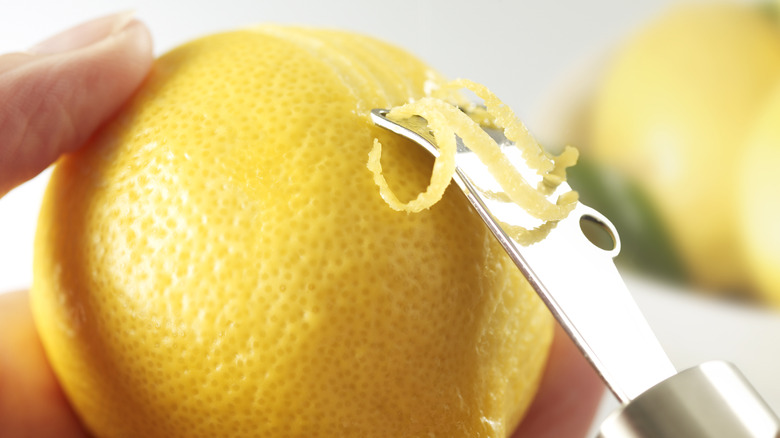How To Store Leftover Lemons, Zest, And Juice
Whether you want a fresh zing of acidity in a cold drink, or to transform a savory dish like chicken soup, a simple lemon is there to provide. This versatile, vitamin-packed fruit has a lot of potential uses, but it's rare when more than a wedge is really needed. Simply put, when it comes to lemons, you'll probably always have some leftovers, and if they're not stored just right, the lemon will just go to waste. To prevent that sad state of affairs, it's time we all learned how to properly store leftover lemons, zest, and juice.
For peak freshness, whole, uncut lemons should be stored in the fridge and used within one month. For best results, keep them in a sealed bag or container inside the produce drawer. Alternatively, lemons can also last up to four months if stored in an airtight container in the freezer. To thaw, simply place the fruit in a bowl of room temperature water for 10 minutes.
Storing lemons at room temperature is also fair game, but fruits kept like this will only last for one week. Halved or sliced lemons, on the other hand, should be wrapped tightly in plastic wrap, or stored in an airtight container to prevent excess air exposure, and placed in the fridge. Use within four days for optimal freshness, as excess oxidation destroys the lemon's flavor. Or, if you'd rather keep some wedges on hand, store them on a tray in the freezer for up to four months.
Now how about that zest?
From bringing a refreshing pinch of tartness to fluffy lemon pancakes, to bringing the perfect splash of tang to a cocktail, lemon zest can do it all. But can it be stored in the fridge? The short answer is yes, but not for very long.
If kept in the fridge in an airtight container, lemon zest should stay fresh for up to one week. Or, for four months of fresh zest, use an airtight storage container in the freezer instead. This method is especially useful if you plan to throw a lemon away and don't have any present use for the zest. The skin of this popular fruit holds plenty of bright flavors in its oils, so don't just throw a lemon peel out when you can keep it on hand instead. Bonus: You don't even need to defrost it. Lemon zesters grate it so fine that it will defrost almost instantly when it's taken out of the freezer.
Finally, let's talk lemon juice
Compared to halved lemons or zest, a lemon's fresh juice has a slightly longer shelf life. If it's stored in the fridge by itself in an airtight container, lemon juice should stay fresh for up to two weeks. (And bottled lemon juice can actually stay fresh for up to nine months thanks to the many preservatives in the bottle.) To easily add fresh lemon juice into drinks and soups, store in an air cube tray in the freezer for up to four months.
But hey, no matter how the lemon or its juices are stored, if you see any brown spots, or if the lemon's skin has become overly squishy, it's time for the fruit to hit the bin, so pay attention. A fermented or moldy smell is also a sign of spoilage. And if you're not keen on saving your lemons for later for fear of mold, you can always put the lemon to work right now and effortlessly clean old oven grime with it instead.


